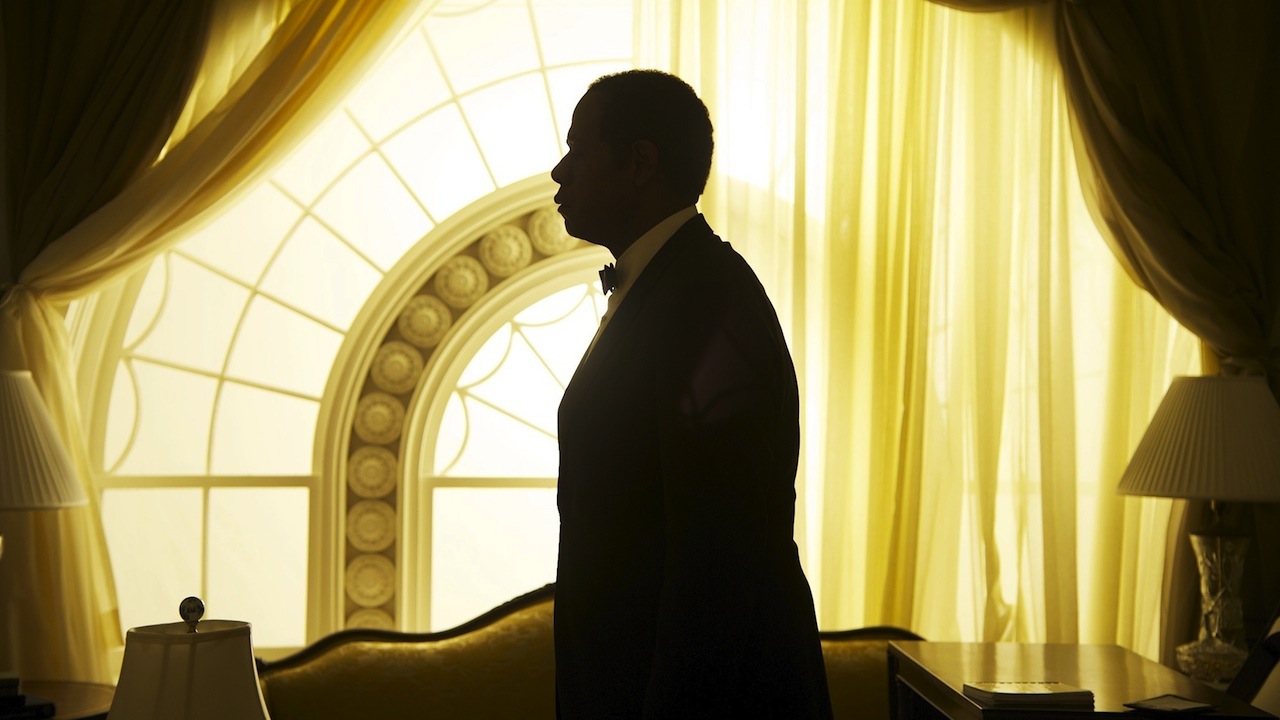Lee Daniels’ The Butler is simultaneously sprawling in its scope, and in-your-face, small-details gritty. Starring Forest Whitaker as Cecil Gaines, an African American butler in the White House from the Eisenhower to Reagan administration, it jumps through two presidents in a single montage while slowing up to indulge strange tangents that totally aren’t pertinent to the narrative (though they are crucial to the movie’s dotty tone). One memorable why-the-fuck-is-this-here moment: President Lyndon B. Johnson sitting on the toilet, surrounded by his dogs.
And in what is easily one of the most curious scenes in any movie this year–mainstream, indie, or experimental–Cecil and wife Gloria, played by Oprah Winfrey, get down to Soul Train, both wearing the same tight, black and white jumpsuit, blurring gender roles, heightening the nervy eroticism. Then, their dance is interrupted by a soldier at the door, informing them that their youngest son, Charlie, died in Vietnam. What the hell do you even do with a scene that overstuffed with sex, longing, and tragedy? It’s the Lee Daniels-esque scene to end all Lee Daniels-esque scenes, which is saying something for the guy who also made Shadowboxer (a May-December incest romance crime movie), Precious (a greasy inner city spleen vent that understands pleasure and pain are often intertwined), and The Paperboy (a bat shit crazy bondage and urination-filled Southern noir).
 Unlike his previous three movies, which were thoroughly unrestrained, The Butler indulges Hollywood’s demand for an uplifting beats, and then fills every tiny gap with the trashy tics. One of many way-too-on-the-nose scenes finds Carter, played by Cuba Gooding Jr. –all real talk (“When did he start calling us Negroes? That nigga says nigger more than I say nigga!” he says about LBJ) –acknowledging the face African Americans must put on to placate whites. It speaks to the black experience, particularly to Cecil, whose upward mobility hinges on being invisible. And it’s a meta-commentary on what it’s like to be a daring, rough-hewn black filmmaker like Daniels. Black movies must be polite if they are to go mainstream. Filmmakers are, frankly, ghettoized if they “go for it.” But Daniels reveals both of his faces at once. You’re getting a “proper” telling of history, and from time to time, a significantly knottier version.
Unlike his previous three movies, which were thoroughly unrestrained, The Butler indulges Hollywood’s demand for an uplifting beats, and then fills every tiny gap with the trashy tics. One of many way-too-on-the-nose scenes finds Carter, played by Cuba Gooding Jr. –all real talk (“When did he start calling us Negroes? That nigga says nigger more than I say nigga!” he says about LBJ) –acknowledging the face African Americans must put on to placate whites. It speaks to the black experience, particularly to Cecil, whose upward mobility hinges on being invisible. And it’s a meta-commentary on what it’s like to be a daring, rough-hewn black filmmaker like Daniels. Black movies must be polite if they are to go mainstream. Filmmakers are, frankly, ghettoized if they “go for it.” But Daniels reveals both of his faces at once. You’re getting a “proper” telling of history, and from time to time, a significantly knottier version.
Often, it is hard to tell which one you’re viewing. The Butler begins where you would expect, with Gaines at the White House. And then the movie cuts to a plantation in the 1920s where Gaines’ mother was raped and his father murdered. Imagine a scene from Django Unchained jarringly spliced into some mindful Oscar-bait.
Later on, when Gaines is hired by the White House, he notices it employs a majority-black behind-the-scenes staff. The White House operates a bit like a plantation, it seems. That jagged jump from the White House to the plantation early in the movie quietly foreshadows this low-key realization. For such a notoriously over-the-top director, this is subtle, tricky filmmaking.
 Hilariously, a couple of critics seem offended by this forked approach. Of all the adjectives one could use for a pulpy black filmmaker taking on a whole lot of American history in two hours, David Edelstein of New York Magazine settled on “thuggish.” Yikes. And Kenneth Turan, for the Los Angeles Times, commented on Daniels’ supposed one-note take on the movie’s white people: “Daniels [has a] tin ear when it comes to white folks, individuals who do not have a fraction of the recognizable humanity of the black characters even in the rare moments when they’re not being racists or morons or both.” For consistency, let’s hope Turan dismisses every Hollywood movie that portrays black characters like that.
Hilariously, a couple of critics seem offended by this forked approach. Of all the adjectives one could use for a pulpy black filmmaker taking on a whole lot of American history in two hours, David Edelstein of New York Magazine settled on “thuggish.” Yikes. And Kenneth Turan, for the Los Angeles Times, commented on Daniels’ supposed one-note take on the movie’s white people: “Daniels [has a] tin ear when it comes to white folks, individuals who do not have a fraction of the recognizable humanity of the black characters even in the rare moments when they’re not being racists or morons or both.” For consistency, let’s hope Turan dismisses every Hollywood movie that portrays black characters like that.
Caricaturing white folks (including major historical figures!) is a conscious decision on the part of Daniels. In a movie that turns big deal events inside out, plucking the black servant characters out of the background and moving them to the foreground, and turning presidents of the United States of America into Warren Beatty’s Dick Tracy-like white cartoons, affording whites “humanity” is beside the point. Daniels put together a radical Hollywood box office hit, going through the motions of po-faced historical drama and undercutting them whenever he gets the chance. The Butler is a warts-and-all, full-stop nutty sprint through racial progress. It’s a truly strange movie, couched in enough Oscar-grabbing moves to conceal just how adventurous and downright weird it gets.



